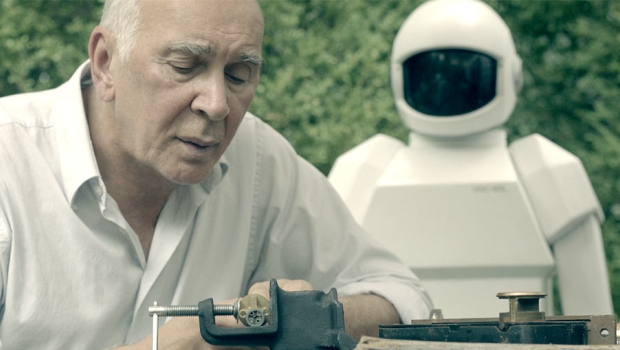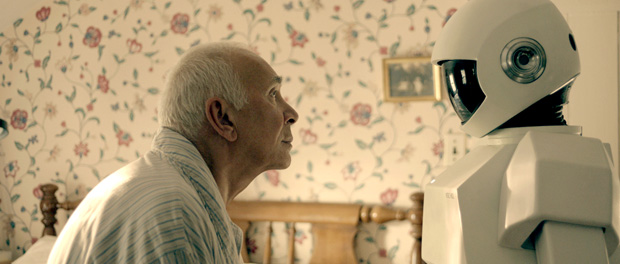The Duplass brothers (Jay and Mark) are the original kings of mumblecore, and, after a period of flirtation, they have apparently decided to embrace the mainstream with Jeff, Who Lives at Home. Starring Jason Segel as the Jeff of the title and Ed Helms as his brother Pat, the comedy-drama focuses on a family as they struggle to determine what exactly it is that they want. Susan Sarandon, Judy Greer, and Rae Dawn Chong also star in the 2012 film.
Jeff is thirty years old and still living in his mother’s basement. He doesn’t have a job and it does not appear that he is looking for one, he smokes too much pot, and has seen the movie Signs by M. Night Shymalan too many times for comfort. According to him, Signs eventually reigns in all the meandering and contains one perfect moment, and, while I doubt the veracity of that statement, it leads him to his personal philosophy: eventually life will contain one perfect moment that makes up for everything that occurs leading up to it. He looks for signs in everyday life, and his marijuana-infused state of mind leads to conclude that the name Kevin will lead him to his destiny. His logic is oddly sound.
Pat is Jeff’s older brother and he does not live at home. Pat is married to Linda (Judy Greer), who seems to be on the verge of finally reacting to the passive-aggressive back and forth her marriage has devolved into. Pat is the kind of guy who is solidly middle-class, goes to Hooters on his lunch break, and can be talked into actually believing that they are basically giving a Porsche away for free if there is only a small down payment. Eventually Pat and Jeff cross paths and Pat must finally confront the state of his marriage.
Sharon (Susan Sarandon), the mother of Jeff and Pat, is in a bit of a funk. She resents her kids, she’s bored in her job, and she hasn’t had sex since her husband died. So, when she starts getting messages from a secret admirer, she is more than a little skeptical of their intentions. Following some urging from her friend Carol (Rae Dawn Chong), she decides to give it a go, though the result is quite surprising to her (but not us). As these kinds of movies tend to do, the main cast ends up in the same place at the same time, and things find a way to resolve themselves, for the time being at least.
Jeff, Who Lives at Home is a film extremely reliant on the contrivances of the script, and no matter how sparingly the Duplass brothers filmed it, that kind of thing does not go unnoticed. This is a rather short film, clocking in at just over eighty minutes, so the need to keep the plot moving at a reasonable clip is rather high, the but the manner in which it was done could have been more subtle. Jeff, as a character, seems to have embraced fate and the interconnected nature of the universe as a means to motivating himself, so the usage of things seemingly occurring by fate makes a degree of sense considering this film isn’t damning its title character, but it all just rang so hollow. Also: the subplot regarding Susan Sarandon’s Sharon and the coworker who secretly admires her was sweet but not affecting.
Issues regarding the plot aside, Jeff, Who Lives at Home was a very well-acted film by all four principles. Jason Segel has been a bastion of comedic solidity (I really need to get this flowery writing in check) for over a decade now, and, despite the comedic bent of the film, is finally beginning to test his dramatic chops. As far as I can tell, Segel is fully up to the task and demonstrates this by spending much of the film either by himself or with the camera zoomed closely on his face.
Ed Helms is an actor defined by how comedic his intensity can become before it just becomes sad (note: the later seasons of The Office). In Jeff, Who Lives at Home, Helms embraced the inherently pitiable, if frustrating, manner his characters typically act, and gave what may be his strongest performance to date. Helms’ willingness to let his characters be legitimately unpleasant and unlikable makes him a natural fit for the Duplass brothers, who have made something of a career out of mining the aspects about people that tend to annoy other equally annoying people.
Judy Greer is in many ways the ultimate supporting player in Hollywood. Indie or mainstream, television or film, she seems to pop up a few times a year to elevate whatever material she is tasked with working with. Her Linda is a frustrated woman, her marriage is failing and her husband has depleted the funds they had been saving to buy a house in order to purchase an ill-advised Porsche. So, if Linda were to have an affair with some guy who is willing to actually put in some effort and listen to her complain, no one would really blame her.
The thing in this film is that Pat and Linda deserve each other. Linda complains that none of her friends like Pat, but admits it was she who poisoned them against him. Pat wants a wife who loves him, but can’t manage to actually love his wife. These are deep problems, and while a day of catharsis may help, some wounds just don’t heal. As can be expected, Jeff’s search for meaning and following of signs doesn’t lead him inwards, it leads him straight into the middle of the cold war between his brother and sister-in-law.
I didn’t like the ending of this movie. Maybe it is the pessimist in me, or maybe it is as someone who thinks a deus ex machina should be reserved for a Greek drama or something more irony-laden, but the ending just didn’t sit right. What occurs is a cop-out used to ensure a happy(ish) ending, and while I can appreciate the desire to end on a more positive note, it didn’t work for this viewer. I am perfectly content for something to end happily if it makes, well, sense, but the final few scenes of Jeff, Who Lives at Home just didn’t make all that much sense to me.
Jeff, Who Lives at Home is Jay and Mark Duplass’ first legitimately mainstream film, and it is competently done if a bit disappointing. This film is demonstrative of many of the frequent pitfalls of independent cinema: it confuses the intimate for the unambitious, is content to be reflective rather than attempt something revelatory, and thinks a shaky camera is a good idea. The cast, primarily Jason Segel and Ed Helms, does an exceptional job and manages to elevate the material somewhat, but unlike Signs (this is Jeff’s opinion, not mine), all the meandering doesn’t actually manage to culminate into the one perfect moment they were clearly intending to achieve.





